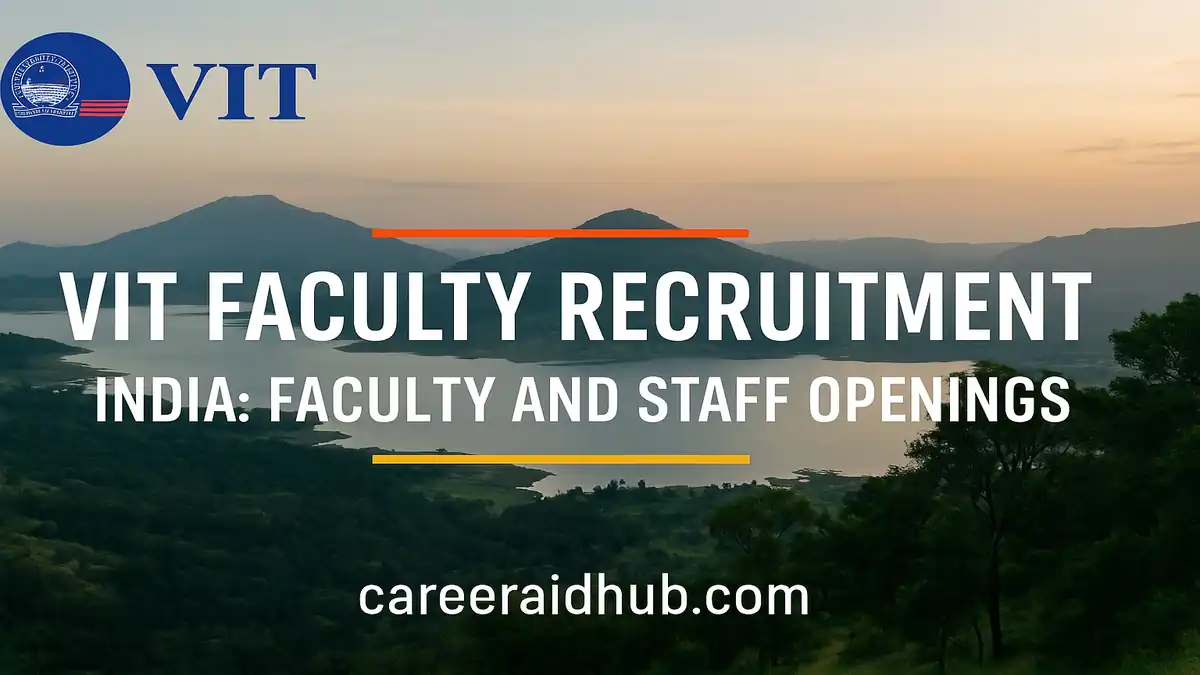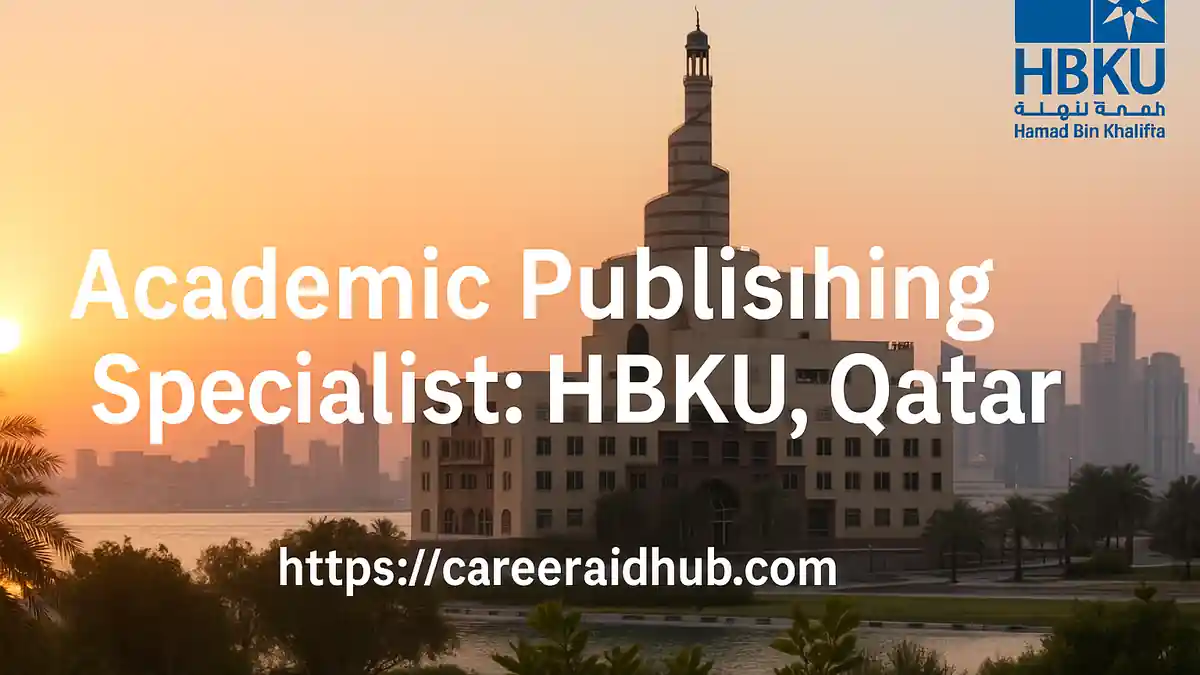Hamad Bin Khalifa University (HBKU) anchors a research-intensive ecosystem in Qatar’s Education City. The university recruits academics and scientists across seven colleges and several national research institutes, with openings in public policy, humanities and social sciences, Islamic studies, science and engineering, health and life sciences, computing, and law. The official careers portal publishes live vacancies, closing timelines, and role expectations, making it the authoritative first stop for applicants.
Build a high-impact academic career in Doha’s Education City. HBKU hires across colleges and national research institutes, offering tenure-track faculty, professor-of-practice, and research-scientist roles. Align your scholarship with institute missions, benefit from competitive packages, and apply through the official careers portal using a focused, evidence-rich dossier.
Why HBKU Stands Out
Interdisciplinary Research Architecture
HBKU integrates graduate education with mission-driven research through three national institutes—Qatar Environment and Energy Research Institute (QEERI), Qatar Biomedical Research Institute (QBRI), and Qatar Computing Research Institute (QCRI). This architecture shortens the path from fundamental inquiry to solutions with measurable societal impact.
Portfolio Depth and Hiring Variety
The careers portal typically lists assistant, associate, and full professor roles, professor-of-practice tracks that emphasize industry engagement, and scientist positions inside the institutes. Consequently, applicants can match career stage and scholarly trajectory to appropriately scoped responsibilities.
Competitive Employment Package
Most postings note a tax-free salary structure with additional benefits such as accommodation allowance, annual paid leave, and
medical insurance. These terms are regionally competitive and help international hires transition smoothly to Doha.
Education City Advantages
Situated within Qatar Foundation’s Education City, HBKU employees and their families gain access to extensive libraries, cultural venues, sports facilities, and shared laboratories. As a result, the campus environment supports both research productivity and quality of life.
Where the Opportunities Are
Colleges Recruiting Academic Faculty
College of Public Policy (CPP). Faculty roles support graduate programs in public and social policy. Descriptions typically emphasize research excellence, policy engagement, and evidence of external funding.
College of Humanities and Social Sciences (CHSS). Postings may feature areas such as women, society and development, translation studies, or counseling psychology, often prioritizing regional expertise and interdisciplinary practice.
College of Islamic Studies (CIS). Open-rank appointments seek scholars with strong publication records and graduate teaching experience, grounded in program-specific expertise.
Other colleges. Science and Engineering, Health and Life Sciences, and Law advertise open-rank positions periodically. Review individual postings to match disciplinary fit.
National Research Institutes Recruiting Scientists
QEERI (Environment & Energy). Roles span applied climate science, sustainable cooling in arid regions, water and energy systems, and geospatial resilience. Candidates who link high-fidelity
methods to policy-relevant solutions stand out.QBRI (Biomedicine). Programs address neurological disorders, cancer, diabetes, immunology, and precision medicine. PIs and staff scientists with translational pipelines—datasets, clinical collaborations, or diagnostic platforms—are highly competitive.
QCRI (Computing). Opportunities typically cover AI/ML, Arabic language technologies, cybersecurity, big data, and societal computing. Applicants who demonstrate deployment at scale, open-source leadership, or industry partnerships are favored.
Application tip: Each vacancy clearly indicates the hiring entity (college or institute). Use that signal to tailor your dossier to the unit’s mission, evaluation metrics, and collaborative culture.
What HBKU Typically Looks For
Core Academic Criteria
While requirements vary, faculty postings commonly emphasize:
Doctorate in the field with a publication record aligned to rank.
Teaching excellence evidenced by evaluations, curriculum innovation, or graduate supervision.
Active research pipeline—grants, citations, datasets, software, or policy outputs.
Collegial leadership with the capacity to collaborate across programs and institutes.
Institute-Track Competencies
Research-scientist roles in QEERI, QBRI, or QCRI foreground methodological depth, project delivery, mission alignment (e.g., climate adaptation, sustainable
energy, biomedical diagnostics, or AI deployments), and cross-functional teamwork.
Benefits Snapshot
Compensation and Allowances
Academic postings typically include tax-free salary, accommodation allowance, annual paid leave, and medical insurance. Exact terms depend on rank and appointment type, so verify the “Remuneration” section of each listing.
Campus Resources and Family Life
Education City’s shared infrastructure—core facilities, library systems, cultural programs, and recreation—supports vibrant research groups and a family-friendly relocation. These amenities can meaningfully improve onboarding and long-term retention.
How to Apply (Step-by-Step)
1) Scan and Filter the Portal
Start on the official careers portal. Filter by college, institute, or job family. Open role cards to read the scope, minimum qualifications, preferred expertise, closing timelines, and application links.
2) Study the Full Description
Note responsibilities (teaching, research, service), program context, and any accreditation requirements. Flag fit statements—these guide how you pitch your contribution.
3) Assemble the Dossier
Prepare a concise letter of interest (often ≤2 pages), a current CV, recent teaching evaluations, and references. Some postings request a research and/or teaching statement. Wherever possible, quantify impact—grant totals, citations, datasets, software, or policy briefs.
4) Submit Online
Use the “Submit Application” link within the vacancy. HBKU routes submissions through a secure online form. Confirm file formats, page limits, and any portfolio links before uploading.
justify;">5) Track the Timeline
Many roles are reviewed on a rolling basis until filled. Shortlisted candidates are contacted for interviews and may be asked for seminars, sample syllabi, or additional materials.
Strengthening Your Dossier
Show Institute or Program Fit
For QEERI, foreground climate modeling, arid-region energy systems, or water-energy nexus research. For QBRI, emphasize translational pipelines and clinical partnerships. For QCRI, showcase high-quality code, reproducible ML systems, or real-world deployments.
Quantify and Contextualize Impact
Move beyond publication counts. Cite grant values, citation indices, datasets released, patents filed, software adoptions, or standards contributions. Because impact varies by field, explain why your metrics matter.
Demonstrate Teaching Innovation
Briefly document inclusive course design, project-based learning, or technology-enhanced instruction relevant to graduate cohorts. Where applicable, reference capstone supervision and outcomes.
Engage the Region
Highlight collaborations in the Gulf or MENA region, especially those aligned with national R&D priorities. Regional engagement often signals staying power, applied relevance, and partnership capacity.
Life and Research in Education City
Shared Laboratories and Core Facilities
Education City concentrates laboratories, workshops, maker spaces, and advanced instrumentation. This density simplifies access to methods and fosters cross-disciplinary projects.
A Connected Academic Community
Seminars, colloquia, and visiting-scholar programs draw researchers from across the region and beyond. In turn, your group can host symposia, organize methods studios, and build networks that extend well past campus.
Final Tips and Next Steps
Make Your First Impression Count
Lead with a crisp statement of fit: your research agenda, why HBKU, and how your work advances the host unit’s priorities. Then, anchor the narrative in evidence—grants, outputs, and mentorship outcomes.
Optimize for Reviewers
Use clear headings, short paragraphs, and descriptive filenames. Provide stable links to open datasets, code repositories, or portfolios. Additionally, align your talk titles and abstracts to the institute’s research themes.
Plan the Move
If relocating, factor in Education City amenities, school options, and commute logistics. Early planning eases onboarding and helps research groups ramp quickly.
Proceed here: apply through the official HBKU portal, study each vacancy carefully, and tailor your dossier to the unit’s mission and outcomes. HBKU Careers — Official Portal
Feature Details
| Feature | Details |
|---|
| Program | Scientific & Academic Careers at Hamad Bin Khalifa University (HBKU) |
| Host Country | Qatar (Doha, Education City) |
| Funded By | Hamad Bin Khalifa University (Qatar Foundation) |
| Duration | Varies by appointment (faculty contracts; institute research posts) |
| Study Mode | Full-time, on-site (select roles may consider hybrid duties) |
| Eligibility | Doctorate or terminal degree; record of scholarship, teaching excellence, and collaboration aligned to rank |
| Financial | Typically tax-free salary, accommodation allowance, medical insurance, annual paid leave (see each vacancy) |
| Fields | Public policy, HSS, Islamic studies, science and engineering, health and life sciences, law, AI/computing, energy, environment, biomedicine |
| Deadline | Rolling; next review window projected Aug 2026 — we will update soon |
| Official | HBKU Careers — Official Portal |
Conclusion
HBKU offers a distinctive blend of graduate education and institute-driven research, supported by competitive benefits and the shared infrastructure of Education City. By aligning your dossier to unit missions, quantifying impact, and submitting through the official portal, you can compete effectively for faculty or scientist roles in Doha.
Frequently Asked Questions
What scientific and academic roles does HBKU offer?HBKU hires tenure-track faculty, professors of practice, staff scientists, research engineers, and postdoctoral fellows. Moreover, specialized technical and lab management positions appear across institutes.
How do I apply for HBKU faculty and scientist jobs?Visit the careers portal, filter relevant units, and submit your dossier online. Then, follow role-specific instructions for documents, file formats, and any portfolio links.
Which institutes at HBKU recruit scientists regularly?Typically, QEERI (environment and energy), QBRI (biomedicine), and QCRI (computing) advertise research roles. Furthermore, college-based labs also post project-funded scientific positions.
Is the HBKU salary package tax-free?Most academic and research postings state tax-free salary with allowances. However, always verify each vacancy’s remuneration section for exact terms and eligibility.
What documents strengthen my HBKU application?Provide a tailored cover letter, detailed CV, recent teaching evaluations, and referee contacts. Additionally, include research/teaching statements and evidence of grants, datasets, or software.
Are HBKU roles tenure-track?Many open-rank faculty posts align with academic appointment pathways. Nevertheless, confirm tenure specifics, evaluation criteria, and promotion timelines within each vacancy description.
Does HBKU provide housing or relocation support?Job pages commonly note accommodation allowance and onboarding support. Still, benefits vary by rank and unit, so review each listing carefully before applying.
Can international applicants apply for HBKU positions?Yes. HBKU welcomes international applicants. Moreover, shortlisted candidates typically receive guidance on visas, work permits, and relocation procedures from HR.
When should I submit an application to HBKU?Apply as early as possible. While many postings accept applications on a rolling basis, earlier submissions usually improve scheduling for interviews and campus presentations.
How can I show strong fit with HBKU’s institutes?Align your proposal to institute missions, cite relevant methods or deployments, and outline clear deliverables. Consequently, reviewers can assess impact and collaboration potential quickly.










